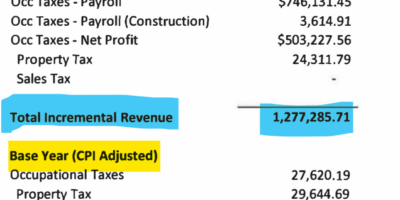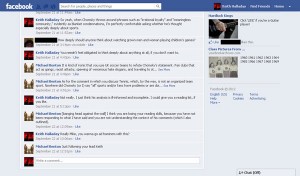By Keith Halladay
I got into it with Michael Benton on Facebook last week, and I’m struggling to understand why.
Michael is a frequent contributor to NoC, as longtime readers may recognize, and as of this semester we’re colleagues in the BCTC Humanities Division faculty, thanks in large part to his formal recommendation. Prior to that we were graduate students together in the University of Kentucky English Department, and, for a short while when I first moved to Lexington, we were next-door neighbors.
That’s almost a decade of acquaintance, and during that time I cannot recall us arguing even once, about anything. Which seems odd, as we’re both loud, opinionated, and at least a little arrogant. Then again, on matters social and political, we’re more or less on the same side; broadly speaking, we have little to argue about.
But when on my Facebook news feed I saw that Michael had posted, as a commentary on the tent city constructed on Avenue of Champions by prospective UK basketball ticket buyers, a link to a blog post that reproduced some of Noam Chomsky’s comments on the cultural role of spectator sports, well, I got my dander up, and I decided to respond. The details of Chomsky’s argument, and of my objections, are not material to the present discussion, so I’ll summarize: Chomsky took a position that organized spectator sports reinforce social divisions and are based on arbitrary loyalties; I replied with a list of examples, a couple involving European soccer clubs, that I believed weakened Chomsky’s argument, and suggested he hadn’t thought as profoundly about sports as he had about a great many other topics.
A couple of hours later Michael posted a lengthy rebuttal of my points that began by noting what he saw as the irony inherent in my citing the examples of European soccer clubs, some of which are notorious for the violent fanaticism of their supporters, in an argument claiming sports did not necessarily reinforce an “us versus them” mentality. And in closing he wondered if Chomsky’s remarks hadn’t “touched a nerve.”
In fact the only thing that had touched a nerve was the accusation that something had, in fact, touched a nerve, but that indignation was tempered by the growing realization that I wasn’t even interested enough in the subject to muster the mental energy to attempt to refute Michael’s rebuttal. So I posted what was essentially a non-response, which led, just a couple of replies later, to my accusing him of stooping to the ad hominem fallacy, and his accusing me of same. And I was so aggravated, by that point, that had Michael been in the room with me I would have happily punched him in the face.
Social divisions and friendship communities
How did it come to this? How did two reasonable, highly educated people, who have only minor differences in outlook on any of the important issues of the day, sink to such depths of frustration that they resorted to personal attacks on one another in the span of a dozen Facebook messages? Had we simply sat down at a coffee shop and chatted, our body language, tone of voice, and shared belief in a basic standard of courtesy would have allowed us to engage the other’s position in a manner that sought common ground and compromise; likewise, had Michael published his ruminations in an edited publication, whether print or online, my initial response, and any subsequent responses between us, would have benefited from the calming influences of a) knowing we were writing (in some cases) for posterity; b) the expansiveness of the space available to make our points; and c) the judicious hand of an experienced editor.
Facebook “discussions,” on the other hand, offer none of these characteristics or possibilities. Michael observed irony in my initial response to his post, but after a couple of days’ reflection, I apprehended a more significant irony: we were arguing about social divisions, meaningless loyalties, and the “us versus them” mentality through a medium that itself is socially divisive, that demands the identification of “us” and “them,” and that is entirely structured on loyalties that more often than not are, under scrutiny, meaningless. This structure demands that its participants pick sides: you either belong to a group or you don’t, you either “like” a post or you don’t, and comments on posts are most often either banal confirmations of the post’s essential rightness, or, in the case of disagreement, outright antagonisms.
Facebook currently claims to have more than 950 million users, which is about one-seventh of the world’s population. That’s an impressive number, and represents around as big an “us” as Hinduism, Roman Catholicism, and the country of India. But while our memberships in the Facebook community grant us affiliation with one of every seven people in the world, they necessarily exclude affiliation with the remaining six; you are either “on” Facebook or you are not, and those who aren’t—”them,” in short—often belong to populations already marginalized by money and class, such as the billions worldwide who lack an internet connection, access to a computer, or perhaps even electricity. So while the Facebook community rivals the world’s major religions and most populous countries in sheer size, it is much more exclusive: this one-seventh is the top one-seventh, and even as the membership continues to grow, the exclusivity will remain.
Now, of this 950 million-member community I claim “friendship” with a little more than 100, while Michael, a much more sociable person than myself, is friends with more than 800. Since I worry about too much of my personal information becoming public and used for nefarious purposes, I block access to my page for all but my friends; although I barely know at least half of my circle (several I’ve never even met), this is my very own “us” that Facebook has provided for; I have become we, and we are not them. I do wish my we were bigger, perhaps as big as Michael’s, but I suppose I can’t blame Facebook for that.
Ephemera
I don’t know if any of my circle read my exchange with Michael on Chomsky and sports, but at least two of his circle did. I know about the first because she “liked” two of my replies with the thumbs-up symbol reserved for that purpose. But not enough, evidently, to want to expand her own circle of friends to include me, since no friend invitation appeared; I of course didn’t invite her into my circle based only on a pair of “likes.” I wouldn’t want to appear desperate, after all. So she remained Michael’s friend, and not mine, though I appreciated her support, all the more for its slightly transgressive nature—she had, after all, crossed enemy lines.
On the other hand, the second person, also a member of Michael’s “us,” inserted himself into the discussion with a spurious one-liner that I answered in kind. What else was there to do? He was an interloper, and had to be dealt with. In fairness, he had rushed in to defend his own, perhaps without having read and understood the position he was attacking. Of course Facebook discourages its members from reading overmuch; in order to wade through my long first comment he would have had to click the “See more” link, for Facebook, perhaps assuming that anything worth saying can be said in one or two sentences, truncates all comments beyond the first 420 characters, or about two or three lines of text. The “See more” link functions as an admonishment: “fine,” it seems to say, “if someone really wants to read all that crap you wrote, they can, but try and keep it brief next time.” On the other hand, spurious one-liners fit the form very well.
My complaint here is precisely that which used to be leveled at email, but in comparison with Facebook, and certainly with Twitter, the old-fashioned email seems capacious, and even quaint in its insistence on greetings, closings and paragraph divisions, all holdovers from the printed letter and memorandum. A too-long email might elicit an exasperated sigh from its recipient, who might only skim its contents, but at least it’s all there.
Email demands a level of familiarity and accountability that Facebook does not. In order to send an email, the sender must have been given the recipient’s address, and be comfortable revealing his/her own; the exchange of email addresses is an act of trust. But interactions on Facebook require no such trust, merely the loosest of associations, meaning that anyone can say nearly anything to anyone else with little fear of repercussion. And even if you do cross a boundary, the ever-churning news feed will consign the offending comment to obscurity in no time, or you can simply delete it yourself. Facebook claims it creates accountability by requiring real names from its members, but it undercuts that claim by providing the means and opportunity to shirk responsibility whenever one likes. Why bother drafting carefully reasoned posts, when a bit of snark or a giggly “So true!” will do? On Facebook, it’s all ephemera.
All of these problems are compounded by Facebook’s still-increasing ubiquity. It seems that not only do we accept the discursive parameters the service imposes upon us, but we can’t seem to get enough of it. I hope some of this is novelty, a fad that will fade away as people discover that they want more—that they have more to say to each other than just sharing the latest “meme,” or tagging each other in vacation photo sets. Or maybe it will simply be displaced by the next big thing, which might be better, or might be even worse. In the meantime, it seems more important than ever to maintain those spaces that provide alternatives to the Facebook model.





Leave a Reply